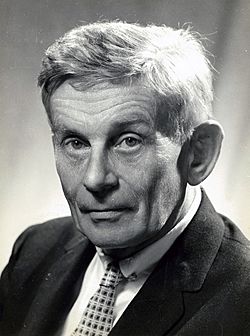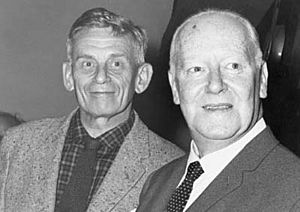Ronald McCuaig facts for kids
Quick facts for kids
Ronald McCuaig
|
|
|---|---|

Studio portrait of Ronald McCuaig in 1949
|
|
| Born | 2 April 1908 Newcastle, New South Wales |
| Died | 1 March 1993 (aged 84) Sydney, New South Wales |
| Nationality | Australian |
Ronald McCuaig (born April 2, 1908 – died March 1, 1993) was a talented Australian writer. He was a poet, journalist, and even wrote books for children. Many people thought he was a very important poet. Geoffrey Dutton called him "Australia's first modern poet." Another famous poet, Kenneth Slessor, said McCuaig was among the best Australian poets.
McCuaig's poems often appeared in The Bulletin magazine. He worked there from 1949, and later became the editor for short stories. He is also well-known in Norway for his children's book Fresi Fantastika. This book was first published in English as Gangles in 1972.
Contents
Early Life and Family
Ronald McCuaig grew up in Mayfield, near Newcastle. This area was quite rural back then. When he was seven, a big steel factory, BHP, opened nearby. Sadly, his mother passed away that same year.
McCuaig's poem Berceuse de Newcastle describes the steel works. It shows how the factory lit up the night sky:
It's always sunset in the east
With a roddle-toddle-toddle,
When the night furnace is in blast
With a roddle-toddle-toddle
And all night long the rolling-mill
Goes roddle-toddle-toddle
Ronald's father worked in a warehouse. He raised Ronald by himself. His father loved the poet Banjo Paterson, and shared this interest with his son. When Ronald was eleven, he spent ten days on a relative's farm. This trip inspired ten poems called Holiday Farm.
Ronald often visited his father at work on Fridays. After the warehouse closed, they would eat at a cafe. Then they would go to a show or sit on a veranda in Hunter Street. They enjoyed watching the busy street below:
A cake-shop glowed across the way
With a rainbow cake display;
I never saw its keeper there,
And never saw a customer,
And yet there was activity
High in the south-western sky:
A bottle flashing on a sign
Advertising someone's wine.
Later, McCuaig got a job at a department store. A friend told him about an opening at 2BL. They needed someone to write a short poem each night about the news. McCuaig got the job, starting his writing career.
Writing Career and Works
Ronald McCuaig started writing for radio in 1927. He wrote light poems for the evening show on 2BL. He also worked for Wireless Weekly for many years. During World War II, he wrote for the ABC and Smith's Weekly. After the war, he wrote for the Sydney Morning Herald.
His first collection of poems was called Vaudeville. He wrote it very quickly in late 1933. The book was published in 1938. Kenneth Slessor praised Vaudeville, calling it "the most remarkable book of Australian poetry." Douglas Stewart said McCuaig's work was both amazing and bold.

McCuaig wrote several poetry books. These include Vaudeville (1938) and The Wanton Goldfish (1941). Later collections were Quod Ronald McCuaig (1946) and The Ballad of Bloodthirsty Bessie (1961). His Selected Poems (1992) included earlier works like Scenes from Childhood. His poems were often included in other poetry collections.
He also wrote short stories and essays, like Tales Out of Bed (1944). He wrote about Australia's art in Australia and the Arts (1972). McCuaig also wrote two children's books: Gangles (1972) and Tobolino and the amazing football boots (1974). Fresi fantastika (1975) was the Norwegian version of Gangles.
Some of his poems were turned into music by George Dreyfus. In 1992, McCuaig received a special award. The New South Wales Premier's Literary Awards honored him for his important contribution to Australian Literature.
The Vaudeville Collection
The poems in Vaudeville were written in just two months. This was at the end of 1933 and early 1934. McCuaig wrote them at night, after his day job as a journalist. Publishers at first thought the poems were too daring. Even when McCuaig offered to pay for printing, seven companies refused. So, in 1938, McCuaig printed Vaudeville himself. He used a hand-press in his flat.
Many of the poems in Vaudeville describe different women. Others explore what it's like to be in love. They also touch on the quiet struggles these women faced. A reviewer named Adam Mckay said McCuaig's poems were "unconventional and indecorous." He praised McCuaig's humor and sharp observations of life.
The Wanton Goldfish and Other Works
McCuaig's second poetry book, The Wanton Goldfish, came out in 1941. These poems were written even earlier than those in Vaudeville. In this book, he explored older poetry styles. He used forms like the Elizabethan song and the difficult sestina. Like Vaudeville, this book was printed on his own press. He enjoyed printing his own books.
After World War II, his book Tales out of Bed (1944) became very popular. Douglas Stewart noted that thousands of copies sold. This was partly because American soldiers in Australia bought many books. The Fairy in the Suitcase, a story in the book, features a fairy who can produce endless bottles of beer. The book also included McCuaig's thoughts on Kenneth Slessor's poetry. This was the first detailed essay published about Slessor.
In 1949, McCuaig joined The Bulletin magazine. He became the short story editor from 1950 to 1960. He also wrote many articles, theater reviews, and poems under the name 'Swilliam'.
McCuaig as a Modern Poet
Geoffrey Dutton called Ronald McCuaig "Australia's First Modernist Poet." He explained that McCuaig was slightly ahead of Kenneth Slessor in this style. Dutton said Slessor was still influenced by Norman Lindsay, who used older writing styles. McCuaig, however, was not under this influence.
Modernism in poetry was a new way of writing. It broke away from old traditions. It focused on observing and describing the modern world directly. T. S. Eliot published his famous modernist poem The Wasteland in 1922. But it was not well known in Australia at first. McCuaig and Slessor were both interested in French modernism.
McCuaig was the first Australian poet to write about the modern world in this new way. Yet, he was not widely known as a modern poet during his life. Geoffrey Dutton and Douglas Stewart believed this was because McCuaig was very shy. He also did not promote himself much. Slessor, who became famous as a modernist, admired McCuaig's work greatly. McCuaig himself said he was influenced by writers like T. S. Eliot and Ezra Pound.
Literary Insights
Ronald McCuaig wrote many articles and essays about Australian literature. He often wrote for The Bulletin. He was the first to write a detailed review of Kenneth Slessor's poetry in 1939. This review was very positive. Some people believe McCuaig's review helped inspire Slessor's move towards modernism.
In 1954, McCuaig edited an anthology called Australian Poetry. An anthology is a collection of poems by different writers. Some critics had mixed feelings about this collection. One critic, William T. Fleming, found it "depressing" compared to international poetry. He thought some poems used old-fashioned rhymes and styles.
However, Helen Heney, another reviewer, liked the collection. She felt it had a unique "Australian aroma." She especially praised Judith Wright's poem "Request to a Year."
McCuaig himself was usually a fair and positive critic. He was not easily disappointed by other writers' work. In his review of Australian Poetry, 1951-1952, he praised many poets. He enjoyed the work of Rosemary Dobson, David Campbell, and Elizabeth Riddell. He was only mildly critical of a few others.
Images for kids
 | Audre Lorde |
 | John Berry Meachum |
 | Ferdinand Lee Barnett |



